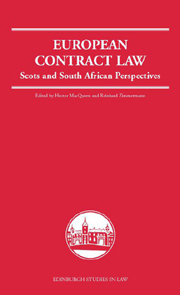Book contents
- Frontmatter
- Contents
- Preface
- List of Contributors
- List of Abbreviations
- 1 Ius Commune and the Principles of European Contract Law: Contemporary Renewal of an Old Idea
- 2 Good Faith
- 3 Offer, Acceptance, and the Moment of Contract Formation
- 4 The Battle of Forms
- 5 Agency
- 6 Threats and Excessive Benefits or Unfair Advantage
- 7 Interpretation
- 8 Third-Party Contracts
- 9 Payment
- 10 Specific Performance and Special Damages
- 11 Termination for Breach of Contract
- 12 Assignment
- 13 Capitalisation of Interest
- Appendix: The Principles of European Contract Law
- List of Cases
- Index
6 - Threats and Excessive Benefits or Unfair Advantage
Published online by Cambridge University Press: 05 July 2013
- Frontmatter
- Contents
- Preface
- List of Contributors
- List of Abbreviations
- 1 Ius Commune and the Principles of European Contract Law: Contemporary Renewal of an Old Idea
- 2 Good Faith
- 3 Offer, Acceptance, and the Moment of Contract Formation
- 4 The Battle of Forms
- 5 Agency
- 6 Threats and Excessive Benefits or Unfair Advantage
- 7 Interpretation
- 8 Third-Party Contracts
- 9 Payment
- 10 Specific Performance and Special Damages
- 11 Termination for Breach of Contract
- 12 Assignment
- 13 Capitalisation of Interest
- Appendix: The Principles of European Contract Law
- List of Cases
- Index
Summary
INTRODUCTION
Chapter 4 of PECL deals with certain factors that affect the validity of a contract. These include threats (Article 4:108 PECL) and excessive benefit or unfair advantage (Article 4:109 PECL). The close relationship between these factors has been appreciated for some time – as long ago as 1937 Professor John P Dawson argued forcefully that the problem of economic duress in particular cannot be divorced from the larger problem of the fair exchange. In that essay Dawson stressed that an appreciation of the development of these concepts in Civil Law systems could help Common lawyers understand certain developments in their own system. But here the aims are somewhat different. The first aim is to test the proposition that many of the solutions found by the draftsmen of PECL have been anticipated in the mixed systems of South Africa and/or Scotland, while the second aim is to evaluate the laws of contract of these systems from a comparative perspective. This could reveal either the need to modify PECL in the light of the experiences of the mixed systems, or to draw lessons from PECL for their further development.
ARTICLE 4:108 PECL: THREATS
Two areas of the Scots law of force and fear and the South African law of duress merit comparison with Article 4:108 PECL. The first of these areas concerns the effect which the force and fear or duress have on the victim and the second with the conduct of the wrongdoer.
- Type
- Chapter
- Information
- European Contract LawScots and South African Perspectives, pp. 151 - 175Publisher: Edinburgh University PressPrint publication year: 2006



